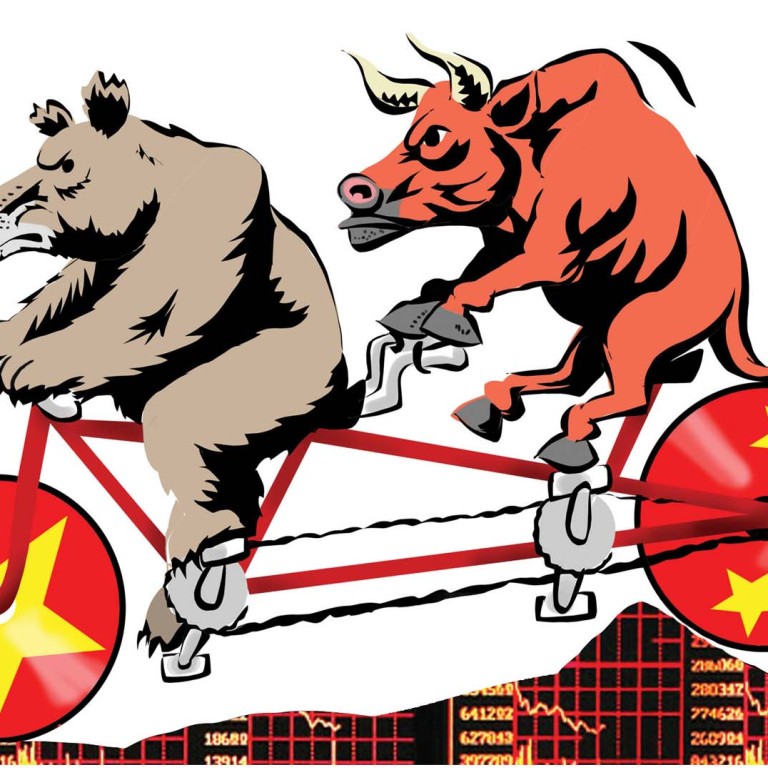
Stock market turmoil won't hold up China's financial reform
G. Bin Zhao believes China acted correctly with its market bailout, and that reforms remain on track
In a recent article, Henry Paulson, former US treasury secretary and former chairman of Goldman Sachs, appealed for the Chinese government to accelerate financial reform after the stock market turmoil. The president of the World Bank, Jim Yong Kim, also said that although many people worry that the market bailout would delay the necessary changes, he believes China will remain committed to reforming the financial sector.
Clearly, the recent volatility in the stock market and the rapid response by the central government touched the nerves of foreign investors and sparked a lot of criticism. International investors have reduced their holdings in Chinese stocks by 44.2 billion yuan (HK$55.1 billion) through the Shanghai-Hong Kong Stock Connect since July 6. The chief executive of BlackRock said the bailout has damaged the country's reputation and could lead international investors away from the Chinese market. Some believe the bailout will affect progress for Shanghai and Shenzhen stocks to be included in the MSCI World index.
The reason for these harsh words and the swift response from overseas investors is that there is a belief that the bailout has disrupted the familiar rules of the game. Seeing that their share of the market suffered a loss, they chose retreat as the best strategy. It is worth noting that some Japanese investors have been aggressively buying Chinese stocks since the recent crash, believing that China's economic growth presents many investment opportunities despite the stock market's ups and downs.
We need to conduct a comprehensive review of the planned stock market reforms to determine exactly the type of capital market we should establish
I believe in the theory of the market economy and staunchly support China's reform and opening-up policy. I occasionally criticise the fact that reforms are not thorough enough, but I fully endorse the series of relief measures taken by the government in this situation. Furthermore, I still believe that if the US government had taken measures in 2008 to save Lehman Brothers, the global economy might have not fallen into such a long depression.
It has been difficult to determine the type of intervention governments should adopt during a financial or economic crisis. Moreover, compared with the London and New York stock exchanges, which have histories of more than 200 years, the Chinese market is just a faltering toddler. It is clearly inappropriate to judge it by applying the standards of the developed markets.
It can be said that the stock market turmoil is one of the most serious economic challenges since Xi Jinping and Li Keqiang took power. Financial risks resulting from this turbulence may have a serious impact on the economy, and may also lead to turmoil on a wider scale. When the relatively fragile overall economy in the so-called new normal period faces a major challenge, all high risks deserve special attention.
From mid-June to early July, the index fluctuated within a range of 1,659 points (the highest was 5,166 and the lowest 3,507). The decline of more than 30 per cent wiped out capitalisation of about 20 trillion yuan, equal to 31 per cent of China's gross domestic product last year (63.65 trillion yuan).
A decline of such a large scale may have led to a wider crisis had the government not acted immediately. If the decline had continued, it may have triggered not only an economic crisis, but also possibly a political event threatening social stability.
Therefore, it is unfair to criticise the government bailout. From the perspective of trying to prevent a wider financial crisis, the measures - which included establishing a stabilisation fund to purchase shares and calling on state-owned enterprises to take on buyback shares - have increased investors' confidence, preventing a continuation of the frenzied sell-off and ensuring that the market did not collapse.
Many people worry that the powerful measures the central government took will affect the progress of financial reform. Professor Li Daokui estimates that the stock market crash will have a limited impact on consumption and the real economy. Although the first five months of this year had a large number of initial public offerings, the amount of total financing for these new stocks accounted for only 4 per cent of total financing for all stocks, bonds and bank loans.
I believe, since there is no widespread erosion of the real economy, China will not review the plans for financial reform proposed at the end of 2013 during the third plenary session of the 18th Central Committee of the Communist Party. However, we need to conduct a comprehensive review of the planned stock market reforms to determine exactly the type of capital market we should establish.
For example, Paulson suggested that China allow market participants - including the top international institutional investors, investment banks and brokers - to compete equally in the Chinese capital market. This viewpoint is particularly questionable. At a time when the domestic counterparts are far from competitive with foreign market participants, further opening of the capital market needs to be carefully researched and designed, and done with extreme caution.
Finally, less than two years after the third plenary session, general financial reforms have made great advancements of a type rarely seen in the past few decades. I believe the dark clouds over the stock market will gradually subside, the sky will be even brighter after the storm, and the winds of reform will continue to blow across the Chinese economy.

